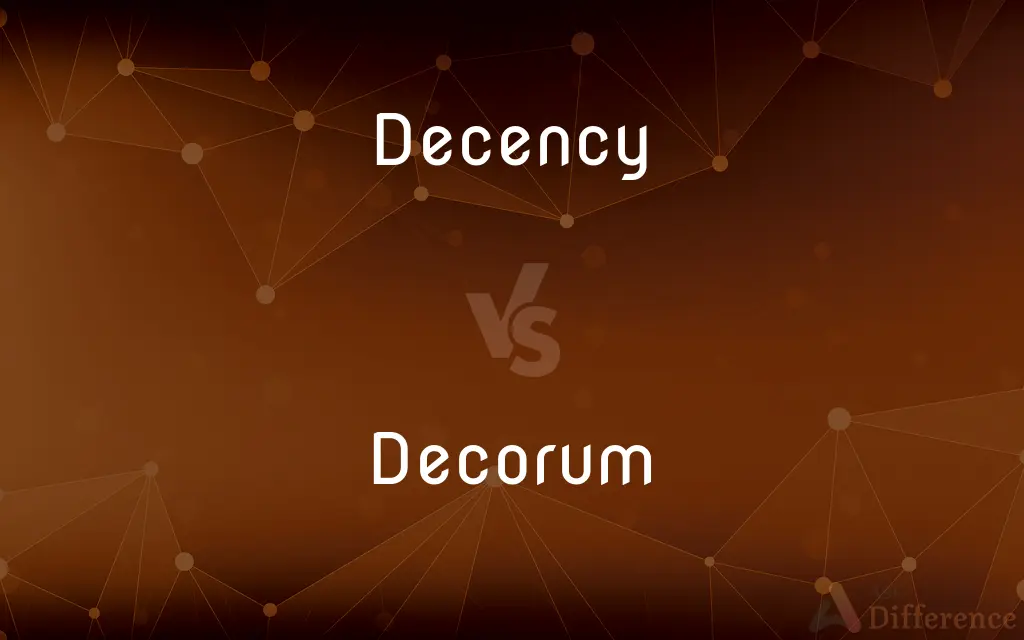Decency vs. Decorum — What's the Difference?
By Tayyaba Rehman — Updated on October 28, 2023
Decency refers to appropriate and moral behavior, while decorum is about etiquette and proper conduct, especially in formal situations.

Difference Between Decency and Decorum
Table of Contents
ADVERTISEMENT
Key Differences
Decency encompasses a broad range of moral and ethical behavior, highlighting respect and propriety. Decorum is more specific, often tied to social etiquette and formal conduct.
Decency is a baseline for acceptable behavior in society, focusing on fairness, respect, and moral principles. Decorum zeroes in on manners and the ceremonial aspect of conduct, especially in public or formal settings.
Decency often implies an innate sense of right and wrong, guiding personal actions. Decorum, however, is learned and adheres to societal or cultural norms of appropriate behavior.
While decency applies to general life and personal interactions, decorum is particularly relevant in structured or formal environments, emphasizing grace and politeness.
Decency is often about treating others well and behaving ethically, regardless of the setting. Decorum, on the other hand, emphasizes the external aspect of behavior, conforming to established norms and expectations.
ADVERTISEMENT
Comparison Chart
Scope
Broad, moral behavior
Specific, etiquette and conduct
Focus
Respect, fairness, ethics
Manners, ceremonial conduct
Application
General life, personal interactions
Formal or public settings
Nature
Innate sense, personal ethics
Learned, societal norms
Emphasis
Treating others well, ethics
External behavior, conforming to norms
Compare with Definitions
Decency
Conduct that is proper and dignified.
Decency demands we respect each other's views.
Decorum
Observance of formal rules of conduct.
The event was conducted with perfect decorum.
Decency
Suitable or fitting behavior.
Decency requires appropriate language in public.
Decorum
Behavior that is in accordance with etiquette.
He maintained decorum during the ceremony.
Decency
Behavior that conforms to ethical standards.
He showed decency by returning the lost wallet.
Decorum
Suitability in actions and words.
Decorum demands polite conversation in such settings.
Decency
Just and equitable treatment.
Her decisions are always guided by decency.
Decorum
Adherence to established social norms.
Decorum is important in diplomatic meetings.
Decency
Kindness and consideration towards others.
His decency was evident in his charitable acts.
Decorum
A composed and respectful way of behaving.
She showed great decorum at the formal event.
Decency
The state or quality of being decent; propriety.
Decorum
Decorum (from the Latin: "right, proper") was a principle of classical rhetoric, poetry and theatrical theory concerning the fitness or otherwise of a style to a theatrical subject. The concept of decorum is also applied to prescribed limits of appropriate social behavior within set situations.
Decency
Conformity to prevailing standards of propriety or modesty.
Decorum
Appropriateness of behavior or conduct; propriety
"In the Ireland of the 1940's ... the stolidity of a long, empty, grave face was thought to be the height of decorum and profundity" (John McGahern).
Decency
Social or moral proprieties.
Decorum
Decorums The conventions or requirements of polite behavior
The formalities and decorums of a military funeral.
Decency
Surroundings or services deemed necessary for an acceptable standard of living.
Decorum
The appropriateness of an element of an artistic or literary work, such as style or tone, to its particular circumstance or to the composition as a whole.
Decency
The quality of being decent; propriety.
Decorum
(uncountable) Appropriate social behavior.
Decency
That which is proper or becoming.
Decorum
(countable) A convention of social behavior.
Decency
The quality or state of being decent, suitable, or becoming, in words or behavior; propriety of form in social intercourse, in actions, or in discourse; proper formality; becoming ceremony; seemliness; hence, freedom from obscenity or indecorum; modesty.
Observances of time, place, and of decency in general.
Immodest words admit of no defense,For want of decency is want of sense.
Decorum
Propriety of manner or conduct; grace arising from suitableness of speech and behavior to one's own character, or to the place and occasion; decency of conduct; seemliness; that which is seemly or suitable.
Negligent of the duties and decorums of his station.
If your masterWould have a queen his beggar, you must tell him,That majesty, to keep decorum, mustNo less beg than a kingdom.
Decency
That which is proper or becoming.
The external decencies of worship.
Those thousand decencies, that daily flowFrom all her words and actions.
Decorum
Propriety in manners and conduct
Decency
The quality of conforming to standards of propriety and morality
Decency
The quality of being polite and respectable
Common Curiosities
Can decorum be learned?
Yes, it's often learned and based on cultural norms.
Does decency apply to all social situations?
Generally, it applies to a wide range of social interactions.
Is decorum essential in informal settings?
It's more relevant in formal settings, but good manners are always valuable.
Is decency only about personal ethics?
Primarily, but it also encompasses treating others well.
Can decorum vary across cultures?
Absolutely, as different cultures have different etiquette norms.
Can decency be subjective?
Yes, as different cultures have varying views on what's decent.
Are there rules for decorum?
Yes, often specific to different social or formal contexts.
Does decency relate to legality?
Not directly, but it's about moral and ethical behavior.
Is decency inherent or taught?
It's often an innate sense but can also be nurtured.
Is decorum outdated?
Some aspects may change, but respectful conduct is timeless.
Can one have decorum without decency?
Yes, as one can follow etiquette without being ethical.
Can decency conflict with cultural norms?
Sometimes, as cultural norms may differ from personal ethics.
Does decorum only apply to adults?
No, children can also be taught decorum.
Is decency valued in all societies?
Generally, yes, though interpretations may vary.
Is decency the same as kindness?
Kindness is part of it, but decency is broader.
Share Your Discovery

Previous Comparison
Facetious vs. Flippant
Next Comparison
Bunn vs. BunnyAuthor Spotlight
Written by
Tayyaba RehmanTayyaba Rehman is a distinguished writer, currently serving as a primary contributor to askdifference.com. As a researcher in semantics and etymology, Tayyaba's passion for the complexity of languages and their distinctions has found a perfect home on the platform. Tayyaba delves into the intricacies of language, distinguishing between commonly confused words and phrases, thereby providing clarity for readers worldwide.














































